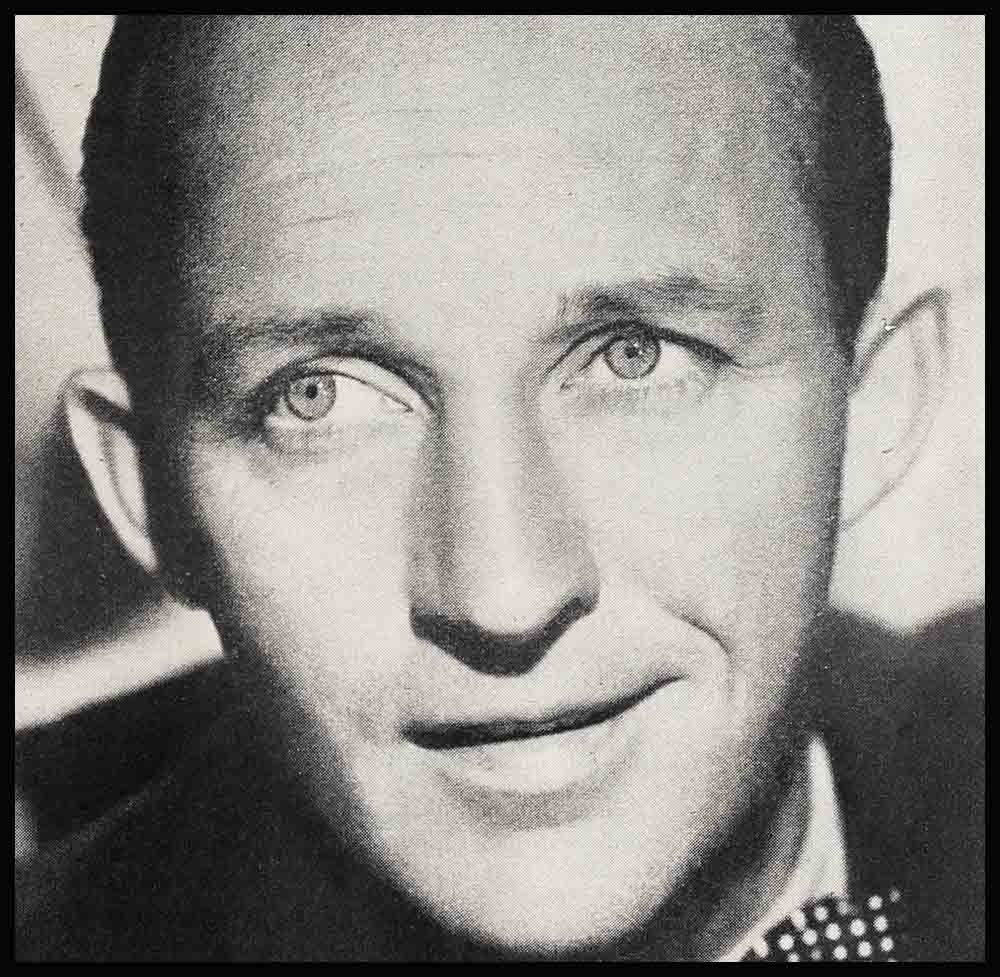
With A Song In His Heart
Taking a line from the picture, “Going My Way,” I feel sure that the right things to say about Bing will occur to me after this has already gone to press.
It’s hard to make a production on paper of the things you know about Bing. So we’ll just go ahead and put them down. And in the end they’ll add up to a picture of a fellow who has a song in his heart, and who is doing a lot to make American hearts happier right now.
I feel proud that a cross-section of mothers, sweethearts, fathers and young sons and daughters in the United States as polled by Dr. Gallup has chosen a man with the simplicity, modesty and humility that is Bing’s as the one to have contributed most to their enjoyment during this crucial war year.
I’ve known him since 1930 when he was a fairly undistinguished member of Paul Whiteman’s “Rhythm Boys,” singing an engagement at the Ambassador Hotel.
Ours is just a friendly relationship that first started on the greens of Lakeside Golf Club. And in fifteen years the only changes I’ve noticed in him are that his voice is a little lower, his golf game a little better and that he’s discarded the wild “blazers” he wore then for the wilder things he affectionately calls sweat shirts now.
Though I have on occasion played golf with him, I’m better at kibitzing than I am at playing right now. I’m a little like Barry Fitzgerald in the picture: I can look at that hedge but I can’t jump it any more.
A priest usually sees people under two conditions. When they’re very, very good and when they’re equally bad. But out on a golf course men are just boys in short pants, perfectly natural, and you can get to the core of them.
One thing I can tell you—in no golf game does Bing ever throw anything as he would have for Barry in that picture. He plays a serious game . . . all business. He has a low handicap and has always had to give me a few strokes.
“Well, Father . . . since you can’t swear . . . every nine holes we’ll let you throw a club just as far as you can,” he’d say.
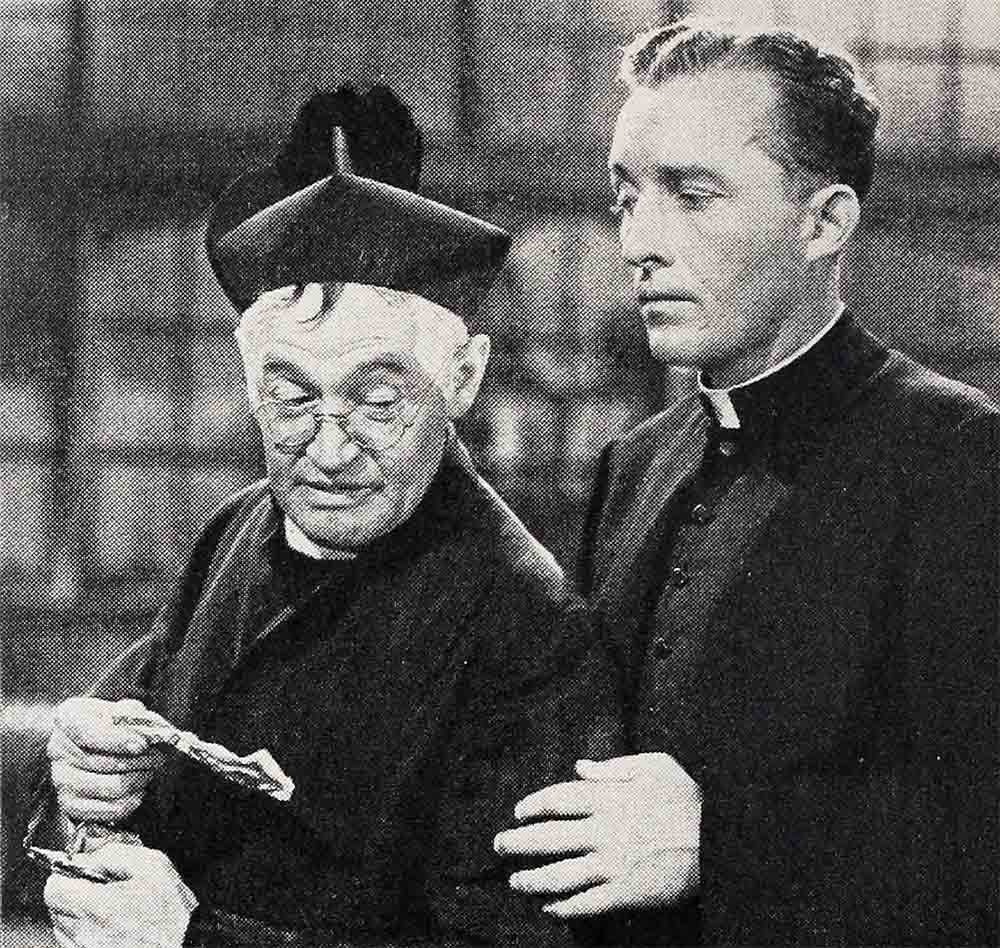
Knowing Bing, the qualities that stand out most about him are his simplicity and lack of pretense or affectation of any kind. He is so natural. Just doesn’t put on a show for anything.
It was this part of his nature that came through so true to life in “Going My Way.” I’ve talked with many priests who’ve seen the picture and have noticed always how surprised they’ve looked when I asked them what they thought of Bing’s “acting” as a priest. They’d never even thought of it as acting. And they would be the ones most ready to criticize him. Yet to all of them he was only very natural in the part. Just being Bing.
In real life he has no affectations even where small matters are concerned. This applies even to a telephone message from him. Where other celebrities and others who have achieved a certain measure of success in various fields may have their secretaries call you and say very business-like, “Father . . . this is So-and-So’s secretary. Mr. So-and-So is calling and would like to speak to you” . . . there’s none of that secretary business with him. Whenever Bing wants to talk to you, it’s simply, “This is Bing, Father.” Or—if messages are left for you— “Just tell him Bing called.”
You respect him for a humility that no amount of wealth or fame have ever been able to change. Getting anything out of Bing about Bing is tougher than paying the new mortgage off on the church. He talks about like Calvin Coolidge. Or less.
And he’ll take none of the credit for “Going My Way,” telling you only that whatever appeal the picture possesses is entirely to Director Leo McCarey’s credit.
“It was conceived by him and the rest of us just did what we were told to do by him. He pulled the strings and I jumped,” he says. “Working in the picture was fun and I’m glad the public seemed to like it as well as they do. It makes a fellow feel pretty good. An actor only gets a chance like that once in a lifetime and I’m grateful that such a chance was given to me.”
To those who congratulated him on portraying a priest and asked how he felt about doing it, Bing always laughed and said that he did approach it with no little fear. “But I haven’t been excommunicated yet. So I guess I got by.”
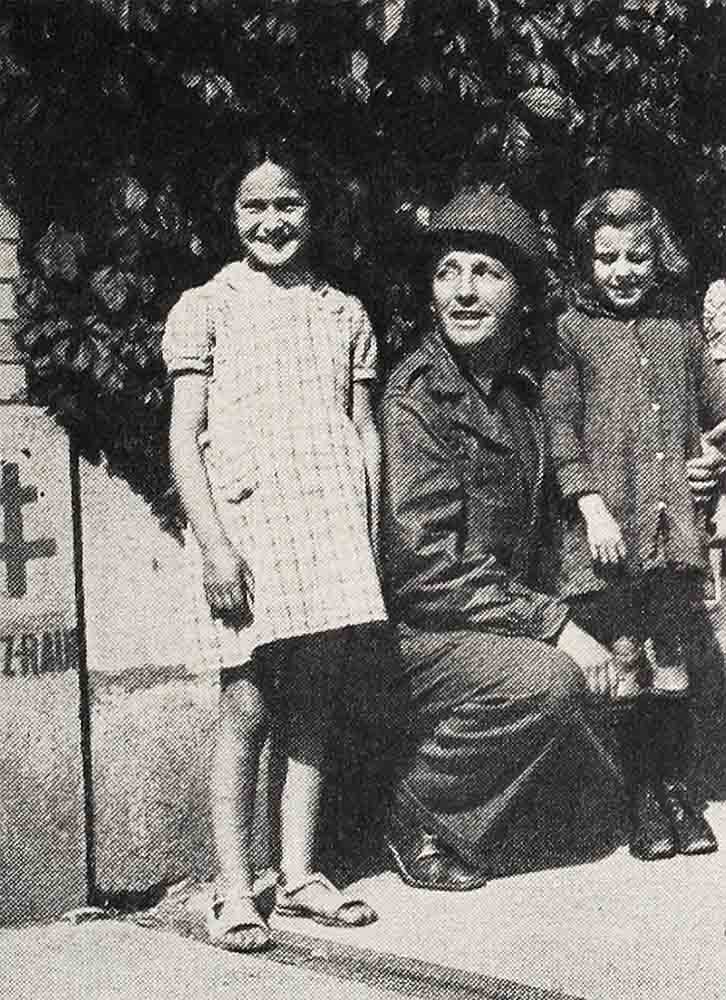
Knowing how he feels about any conspicuous attention, his friends like to tease Bing about the time when he attended a small neighborhood church outside his own parish. When the church was so crowded that he had to go stand in the choir loft where the little girls of bobby-socks age were singing, they got so excited they couldn’t sing a note. Bing was so embarrassed.
He’s a man of few words, but makes them all good. And for a person who has everything, he’s always appreciative of the thoughtfulness of others or any little things they do in his behalf.
For many years at Christmastime I’ve gotten joy out of reading an old book called, “His First And Last Appearance.” Somehow it’s always represented the spirit of Noel to me. This past holiday I sent Bing a copy with a note saying I thought maybe his gang would like it too. I didn’t see him for several weeks after that and had forgotten about it, but wasn’t surprised to find he hadn’t. He came across a room filled with people and said, “About the book . . . Father . . . thanks.”
You can have only respect for the way in which he’s always fulfilled his duties and obligations as a parent. He knows that exacting obedience from children is very important. That children who do obey their fathers and mothers will make finer citizens tomorrow. And he’s always demanded and gotten just that. Each of the four is well disciplined, courteous, obedient, refined and yet all boy.
If you were over in Beverly Hills around the Church of the Good Shepherd on Sundays you’d see them all coming up in the station wagon for the 8:30 mass. Bing and his gang, or four “half-backs,” as he is wont to say.
In the years that the boys have attended the Parochial school at the St. Charles Church in North Hollywood, they’ve been just normal kids, seemingly unaware that they are the children of any celebrity. Just boys among the other boys.
Twelve-year-old Gary is just like his father. And proudly so.
This was especially evident in an amusing anecdote that happened three years ago there when the new choir master arrived at St. Charles to pick out children for the choir.
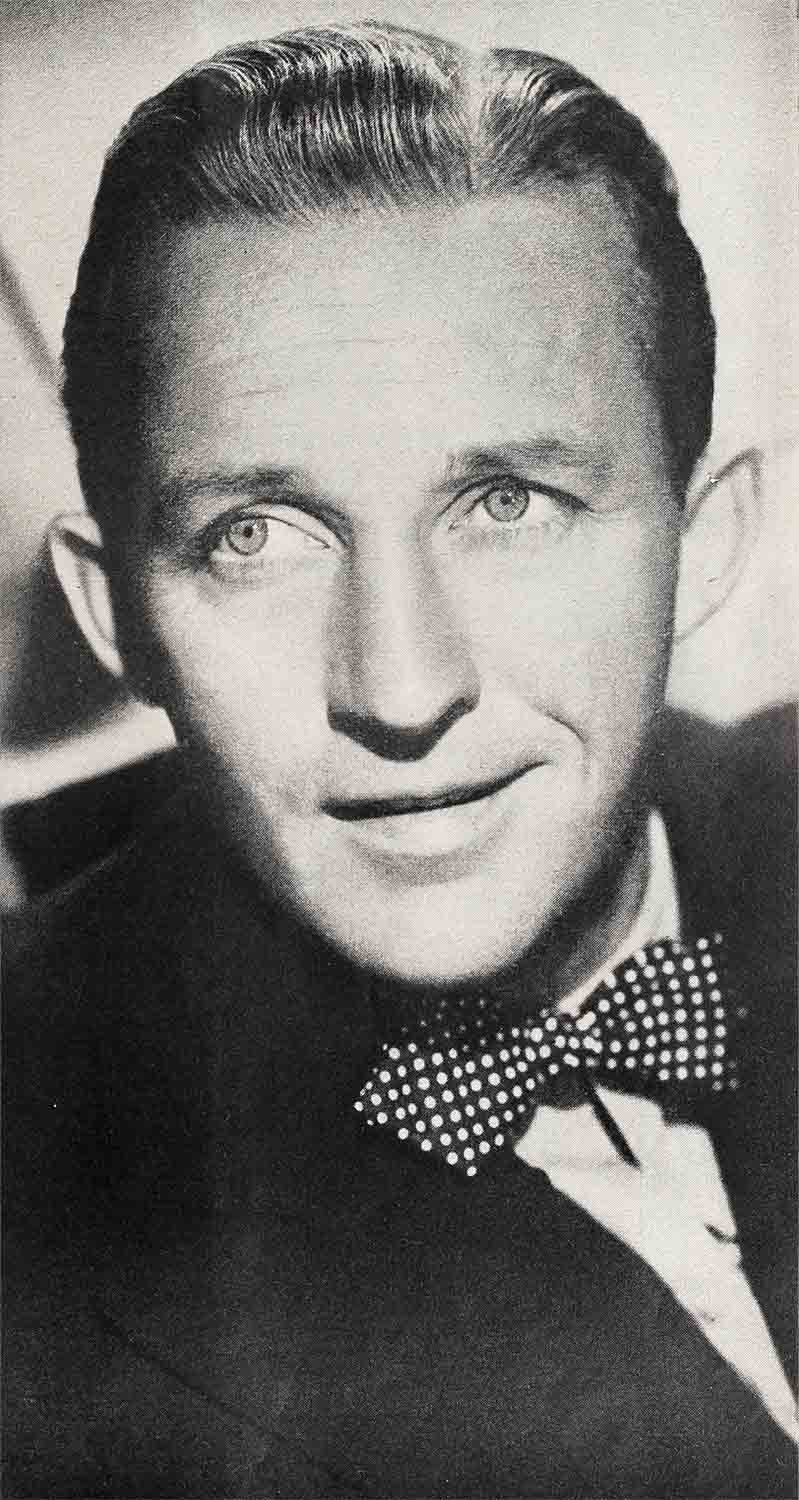
He had all of them assembled together in school and was running them up and down the scales trying them out. Suddenly from one of the boys came a very deep semi-croon that was straining and reaching for the low notes. The choir master almost dropped his hands from the piano at hearing such a strained deep voice coming from a nine-year-old. The child kept on singing like “Deep River.”
Suddenly the music master turned around. “Say, kid, you sound just like—” The Sister who was standing nearby interrupted by leaning over and whispering, “That’s Gary Crosby.”
Gary looked up. The choir master smiled. “I was just going to say that you sound like Bing Crosby,” he said.
‘I’m a baritone,” said Gary proudly, still keeping his voice way down from the usual childish tones. “I’ve got to be a baritone,” he said, matter-of-fact.
It seems to me that Bing has always used good judgment about his business, his voice, his life. Always doing the best job he can do. Taking it all in stride—yet with a measure of dignity and reserve. There’s none of the let-tomorrow-take-care-of-itself that has been popularly believed of him. Tomorrow was usually taken care of by him today.
It goes without saying that one with his humble nature could never be otherwise than generous and compassionate for his less fortunate fellow man. Which is best expressed by something I once heard a friend say of him, “You can always count on Bing to carry his weight in everything.”
Nobody knows the extent of his good willing. And Bing himself makes sure that no one ever will. He says nothing. And he’s always there carrying his weight.
This is true where affairs of the Church and community are concerned as well. Without fanfare. Always casually in his own way. When they were building the new church in the St. Charles Parish, of which Bing had been a member for years, they decided they needed a new organ for the church instead of the old “groan box,” as they called it—the old-fashioned pump organ they were using in the old frame church. They knew Bing would buy it if he thought of it and Hal Bock of NBC was delegated as a committee-of-one on the organ deal. That Thursday he went down to the studio where Bing was rehearsing Kraft Music Hail and suggested that it might be nice if he’d buy the organ for the new church.
“Say,” said Bing, “that might not be a bad idea. See me next Thursday and I’ll talk it over out at the office with Dad and the boys.”
His only comment when they thanked him for the organ was to caution, “Now I don’t want any publicity about this.”
Nobody in the parish said a word. But the next thing they knew some Hollywood columnist had gotten it from the studio some way and was plugging the new church organ with a commercial tie-up. These are things that Bing is very adamant about and always fears. He never wants anything known that he does, but you can always be sure that he carries his weight.
It seems to me that he was never so happily cast in any picture as the casual, tolerant, happy singing priest of “Going My Way,” which showed the human side of religion. Christianity as something that warms and comforts the soul and which is human enough for all to understand. The beauty and reality of the inside of a church instead of the cold forbidding exterior.
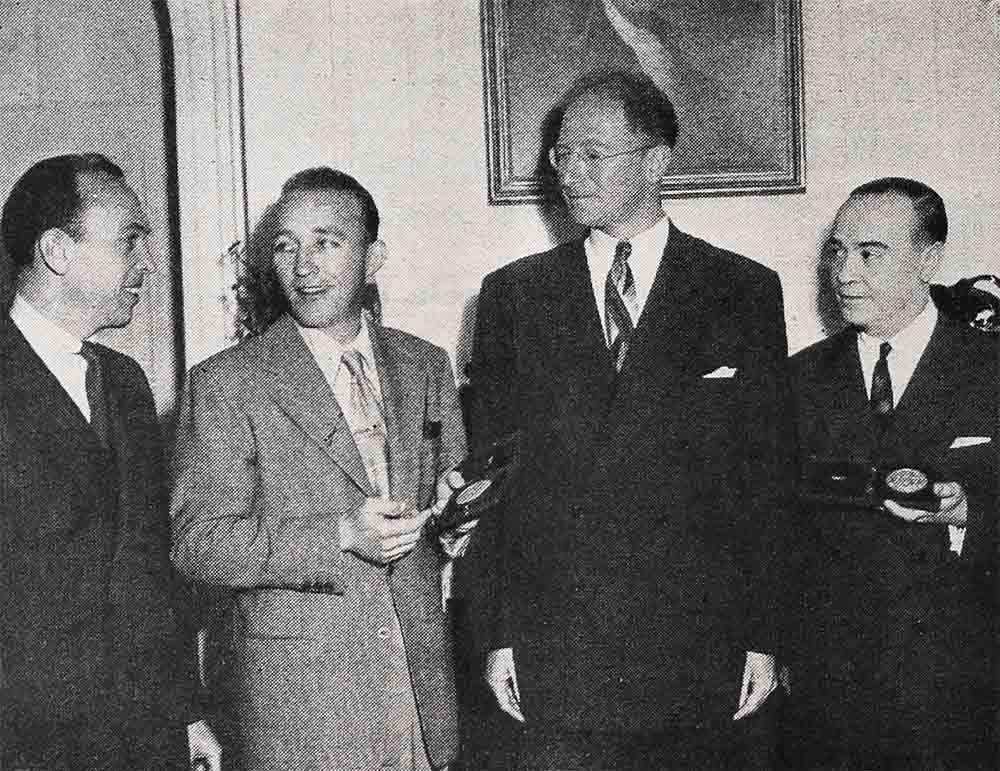
In connection with this thought, I’m reminded of a little story in a child’s reader that I’ve almost forgotten, but which goes something like this: The wind and the sun were having an argument about their respective strengths and determined to prove it by finding out which one could take the cloak off of a traveler coming their way. The wind howled and whipped. And the cloak was drawn tighter. The sun came out and shone down, down, warm and kind. And the man removed his cloak to bask in its warmth and kindly comfort.
This to me is “Going My Way” . . . and Bing’s portrayal of the priest therein. A warm picture of religion that comforts the heart. As Bing said it in the picture, “For some, religion is sour like the deep notes of the bass. For me, religion is joy like the melody on the treble side of the scale. Religion can be bright . . . bring you closer to happiness.”
Yes . . religion can be simple . . . human . . . and understandable. And that’s just the way I see Bing.
Most service men whom I have talked with have seen the picture two or three times and always have these same things to say of Bing. Or a reasonable facsimile to the effect, “I sure would like to know that guy.”
Bing had a letter from a Franciscan Father in New York who wrote that a woman who’d been away from the church for twenty-five years came back and got straightened out after seeing “Going My Way.” And that he hoped Bing and all connected with this fine picture will be given an “assist” by the Recording Angel. So do I.
Actually, though there may be some who think so, there’s nothing unusual about the people you saw in that film. I’ve known many priests like Barry Fitzgerald. Unfortunately a lot of churches ride a heavy mortgage. Somehow there seems to be something that’s not quite normal about a church that’s not in debt. And how many times have all of us heard folks say, “I hope I live long enough to live once in a parish that’s out of debt.” That’s why there are the Barrys . . . who spend sleepless nights worrying about how to raise funds for church debts, new schools, playgrounds, halls and convents.
Yes . . . and I’ve known others who did the things with music that Bing did too. “Toora Loora Looral” has been my favorite song for thirty years. The priest I first heard sing it had a rich baritone voice that he used to advantage by leading a choral group that he’d gathered from rough little urchins from east of Main Street . . . Mexicans . . . Indians . . . and tough little sons of parents who’d drifted by the way. Guiding them mostly by means of song.
Father O’Malley has made it a little tough on the rest of us. My own niece, for instance, now says of me, “You know, Father, you used to be like Bing. But now you’re like Barry Fitzgerald.” No, I guess I can’t clear that hedge any more.
It’s Bing himself who’s causing many a heart to soar over other and higher hedges just now. It’s a wonderful thing what laughter and song can do when the world needs it most.
Though he must appreciate with justifiable pride the various “Oscars,” plaques, or statuettes he’s received, we know that still more valuable to him are the awards that spring from the hearts of mothers, wives and sweethearts throughout the nation, and of the country’s sons and daughters now overseas. From these homes was he chosen as the movie man of the year. Not with statuettes made of bronze or from a plaster mold. But just simple words and heart-felt thanks that reflect what they all feel way down inside for him. Awards that have to do with the happiness that he has inspired in an unhappy, wobbly world.
These awards come straight from the heart . . . like the words of the service men of whom I spoke . . . “I sure would like to know that guy.”
They may come from a sailor in the South Pacific who expressed it in a little poem:
“There are touching scenes on these Islands green.
The most touching I’ll venture to say
Was the peaceful trace
On each shipmate’s face
When we witnessed “Going My Way.”
Or from a corporal in France who comes from Bing’s home state of Washington and who wrote his mother after seeing him overseas: “He hasn’t changed, Mom, since he used to sit on a stump or old log and croon to us back in the black hills near Olympia when we were working with him in a survey party in 1929.”
Or messages that were sent home by boys who would look up from Mass on shipboard, or kneeling in the mud in France, or in a piece of a bombed-out church to find Bing kneeling at their side. “He’s sure some heart-doctor, Mom. Came to us just like a hunk of home.”
These are the kids of whom Bing said, “You know, Father, it gave me the funniest feeling standing there at the mike looking down into the faces of all those wonderful kids. You get a lump the size of a dozen dog-tags in your throat. They’re all winners. Not a photo-finish in the lot.”
The “awards” from these boys are still coming in. And from their parents. Mothers who say to Bing, “Thanks for blotting out war from his young eyes for even a little while.
I’ve had some of these letters, too. From a nephew, Lieut. John Follen . . . a pilot who’s been over Germany twenty times. Another from another nephew, J. E. Jordan, RM 2/c, who’s doing duty in the Marianas on a vessel that carries 10,000 tons of high octane and ammunition. Loaded for death. He wrote me after seeing “Going My Way,” “Did it make us feel good. You know Bing, don’t you, Father? I told the other guys that you did and I was practically an admiral on the ship for a little while!”
Yes . . . these are the “awards” that are coming from these boys and from the hearts of mothers, sisters and sweethearts here at home. Thanks to Bing for blotting out war from their minds and hearts if just for a little while.
For in the midst of the baptism of destruction that’s going on on battlefronts throughout the world, the song, laughter and voice that is Bing’s provide ammunition for the heart.
A good voice is like a good sermon in that it reaches your heart. And Bing’s voice is in this sense a very good sermon . . . for it certainly reaches millions of hearts today.
Never were human voices in themselves more important than they are now. For this is the day of voices. There are terrifying voices of hate and greed that shout and rasp and rant. Tyrants who incite and whip men with their voices into mad animals. Voices of war that egg on destruction for all.
There are voices too—important voices—of a different kind. The voice of Pope Pius the Twelfth pleading for world peace. Other voices that inspire for leadership.
Then there is a voice that brings happiness when the world needs it most. A voice like Bing’s that relaxes . . . eases tension . . . mends bruised hearts and souls.
In these precarious and heartbreaking times the human heart can well use a stimulant.
And what a wonderful thing for a voice like Bing Crosby’s to bring surcease from worry and a musical message that reaches overseas to our gallant men and to their families here. Homey and soothing. That seems to promise peace, restored homes and a better and happier life soon to come.
Yes . . . his voice is for making happiness.
Because of this come awards from hearts that are making Bing Number One in the nation’s heart today.
THE END
It is a quote. PHOTOPLAY MAGAZINE MAY 1945





No Comments